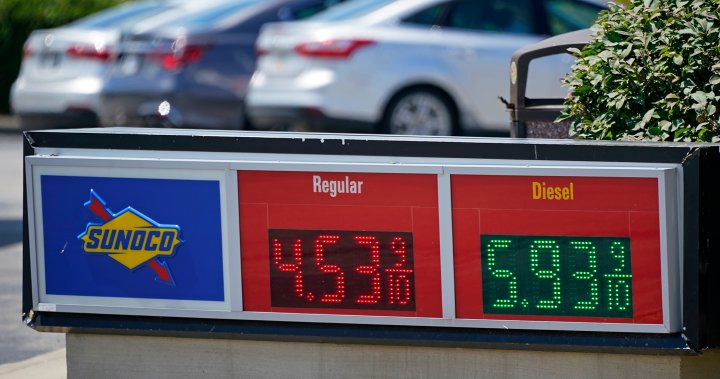
U.S. inflation likely to stay high despite falling gas prices. Here’s why
Global News
Some trends do point to lower future inflation. The supply chain snags that have elevated prices for cars, furniture, appliances and other goods are easing.
Americans may finally be catching a break from relentlessly surging prices — if just a slight one — even as inflation is expected to remain painfully high for months.
Thanks largely to falling gas prices, the government’s inflation report for July, to be released Wednesday morning, is expected to show that prices jumped 8.7 per cent from a year earlier — still a sizzling pace but a slowdown from the 9.1 per cent year-over-year figure in June, which was the highest in four decades.
The forecast by economists, if it proves correct, would raise hopes that inflation might have peaked and that the run of punishingly higher prices is beginning to ease slightly. There have been other hopeful signs, too, that the pace of inflation may be moderating.
At the same time, an array of other economic developments are threatening to keep intensifying inflation pressures. The pace of hiring is robust and average wages are up sharply.
And even as gas prices fall, inflation in services such as health care, rents and restaurant meals is accelerating. Price changes in services tend to be sticky and don’t ease as quickly as they do for gas, food or other goods. Those trends suggest that overall inflation may not drop significantly anytime soon.
President Joe Biden has already pointed to falling gas prices as a sign that his policies — such as releases of oil from the nation’s strategic reserve — are helping combat the higher costs that have hammered household budgets, particularly for lower-income families.
Yet Republicans will push ongoing high inflation as a top campaign issue in this fall’s elections, with polls showing that high prices have driven Biden’s approval ratings down sharply.
On Friday, the House is poised to give final congressional approval to a revived tax-and-climate package pushed by Biden and Democratic lawmakers. The bill, which among other things aims to ease pharmaceutical prices by letting the government negotiate Medicare’s drug costs, is expected to cut the federal budget deficit by US$300 billion over a decade.













